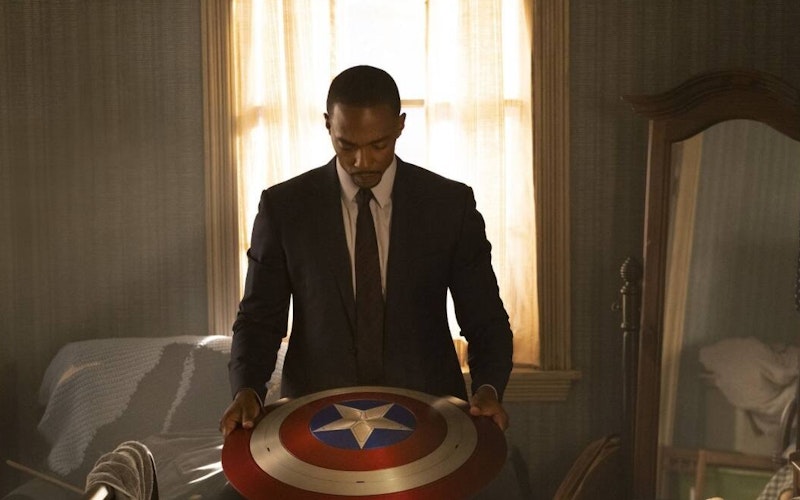
TV
Captain America and Christ’s Second Commandment
“Without justice there can be no love.” bell hooks
The Falcon and the Winter Soldier poses a provocative question: Is the world actually ready to accept and love a Black Captain America?
In the Marvel Cinematic Universe, Captain America has stood for everything American: an indomitable will, a never-give-up attitude, a paragon of virtue, an extremely hard worker, and—above all else—an outstanding patriot. Not only has he represented these values, but he has also always looked a certain way, with “blond hair and blue eyes” (as the Disney Plus series describes him on multiple occasions). Anthony Mackie’s Sam Wilson/The Falcon does not match this description. Yet at the end of Avengers: Endgame, his friend Steve Rogers (the original Captain America) decided to pass the mantle and shield to Sam anyway.
Over the course of the series, Sam reconciles being revered as Captain America with living in America as a person of color who is overlooked. This illustrates the dichotomy many Black Americans face on a daily basis; we are admired for our culture but devalued as human beings. One example of this is when Sam is recognized as The Falcon while trying to secure a loan for his family business. The banker snaps photos of Sam for his own selfish enjoyment, but still won’t help him get a loan. At the end of the day, the banker would rather talk “hero stuff” than address Sam’s tangible need.
In another scene, we clearly see how Sam navigates two different Americas. As he walks through a neighborhood with his partner Bucky (Sebastian Stan), a white man, two policemen stop them for having a spirited discussion. One of the cops insinuates that Sam is causing trouble by directly asking Bucky if Sam is “bothering” him. The cop also specifically asks Sam—but not Bucky—for identification, even telling Sam to “calm down.” When the other cop informs his partner that these guys are Avengers, the tone of the conversation completely changes. When Sam is recognized as Black, he is viewed as a threat, but when he is acknowledged as a hero, he is respected. This is the unjust treatment that people of color deal with on a daily basis while engaging with systems in America—we’re beloved from afar, but despised up close.
Over the course of the series, Sam also learns about the first Black super soldier, Isaiah Bradley (Carl Lumbly). When Sam meets the now-older man, he is disillusioned over how his country has treated him. He was a good soldier, but he was hidden from the public and mistreated by his government—quite unlike Steve Rogers’s experience. Isaiah’s troop was experimented on by the government and given super-soldier serum without their consent. Later, after they were captured by enemy fighters, Isaiah overheard the “brass” discussing their plans to blow up the POW camp where Isaiah’s troops were being held, in order to hide the “evidence” of super soldiers. Isaiah was loyal to a government that would rather kill its own soldiers than let its secrets be exposed. Sad to say this isn’t far from our real world. (Historical case in point: the Tuskegee experiment.) In the words of Isaiah: “Them stars and stripes don’t mean nothing good to me.
TC Podcast: Backsliding (DMX, The Falcon and the Winter Soldier)
The Falcon and the Winter Soldier draws attention to the two different Americas that we live in: one for those who can fit the mold of “blond hair and blue eyes” and another for those who have a darker shade. This injustice has been baked into the way that our systems operate. It is a violation of the second greatest commandment—to “love your neighbor as yourself”—and a reminder of why bell hooks’s words ring so true: “Without justice there can be no love.”
When Jesus is confronted with the question of who is our neighbor, he tells a story in which a Samaritan, who is perceived as different and despised, is actually a hero for seeking justice for an overlooked man. Jesus wraps up the story by commanding, “Go and do likewise.” This should lead us to think about how we are treating people who are perceived as different and even despised. Do we see them in need of justice, but pass by without acknowledging their pain, as the priest and Levite did? In order to love my neighbor, I must seek justice for her. Sometimes, I need to go out of my way to see justice fulfilled. Historically and currently, people of color all across North America have been othered, marginalized, and rejected. As Christians, we must consider how our call to love and racial justice are inextricably linked.
The Falcon and the Winter Soldier thoughtfully illustrates this sentiment, but are viewers ready to accept this message? Personally, as a Black man living in the United States, I hope that we can. (Spoilers ahead.) Sam struggles with bearing the weight of the “stars and stripes” as a Black man who is mistreated by the very country that he represents. At the end of the series, he chooses to carry the shield despite the cost. He chooses to fight for the people that he loves, even though he knows he isn’t fully accepted. After the credits roll, we see the name of the show transition from The Falcon and the Winter Soldier to Captain America and the Winter Soldier. With that, Marvel affirms Sam as Captain America and centers Blackness within its cinematic universe.
Topics: TV